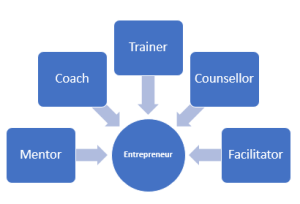Lesson 1. Mentoring VS Coaching

Mentoring and coaching are both development approaches used to enhance an individual’s knowledge, skills, attitudes, behaviours, and professional and personal performance. Both mentoring and coaching are often used interchangeably but are there any are differences between these two practices? Both mentor and coach are regulated professions and the core competences required to perform such activities are very similar:
| Mentor | Coach | |
| Understanding self
Commitment to self-development Managing the contract Building the relationship Enabling insight and learning Outcome and action orientation Use of models and techniques Evaluation Source: EMCC Global Competence Framework[1] for Mentors and Coaches |
Ethical practice
Co-creating the relationship Establishing and maintaining agreements Cultivates trust and safety Maintains presence Communicates effectively Active listening Powerful questioning Direct communication Evokes awareness Designing actions Planning and goal setting Managing progress and accountability Cultivates learning and growth Facilitates client growth Source: International Coaching Federation Core Competencies[2] |
It is worth underlining that the skills and approaches defined by the ICF to the coaching profession are basically the same used to describe a mentor. A good mentor has to be enthusiastic about mentoring and must be willing to help, and be committed, honest, diplomatic, objective, and with a sense of fairness. A mentor must also have the ability to encourage and provide (by effective questioning) and receive feedback (by effective listening). As an experienced individual who gives counselling, support and guidance to someone less experienced (mentee), the mentor must gather relevant technical, management and life experience to share.
Following this description, we could say that a mentor has some of the skills and possibly performs some of the roles expected in a coach, a trainer, a facilitator and a career counsellor. But all these roles require different levels of specialisation.
You can learn more about the roles of a mentor, a coach, a trainer, a counsellor and a facilitator by comparing both tables presented is the following articles:
Article 1: Sorting Out Coaching vs. Mentoring vs. Training[3]
Article 2: Training, Coaching and Mentoring – What’s The Difference?[4]
Article 3: The Differences Between Coaching, Mentoring, Training, and Counselling[5]
[1] EMMC Global Competence Framework, 2015: https://emccdrive.emccglobal.org/api/file/download/0gzGExIyhoRpVFnq5DB7ucXeu1FpQ6pJZk35YbTh
[2] ICF Core Competences: https://coachingfederation.org/core-competencies
[3] https://www.invistaperforms.org/sorting-coaching-vs-mentoring-vs-training/
[4] https://www.accipio.com/eleadership/mod/wiki/view.php?id=1794
[5] https://minds-senses.com/coaching-mentoring-training-counselling/

